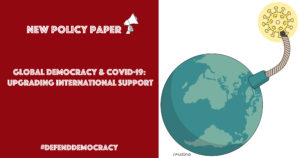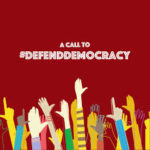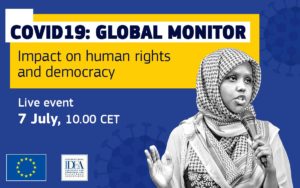
The world’s democracies are showing signs of strain from the COVID-19 pandemic, according to a new Freedom House analysis. The report, titled Democracy Under Lockdown, says “the COVID-19 pandemic has deepened a crisis for democracy around the world, providing cover for governments to disrupt elections, silence critics and the press, and undermine the accountability needed to protect human rights, as well as public health.”
The report, released Friday, found that since the start of the pandemic, the state of democracy and human rights has worsened in at least 80 countries out of 192 nations surveyed. It identifies five major pillars of democracy under threat: government transparency, freedom of press and speech, credible elections, protections for vulnerable groups, and government abuses of power. The latter are evident in elections, with governments postponing or disrupting national polls in at least nine states.

“The new COVID-era laws and practices will be hard to reverse,” said Sarah Repucci, one of the report’s co-authors. “The harm to fundamental human rights will last long beyond the pandemic.”
Between January and September, Freedom House and the survey firm GQR consulted nearly 400 journalists, activists, civil servants and experts in 105 countries and territories, as well as international analysts, bringing the total number of states covered in the report to 192.
But one bright spot, the report suggests, is “the persistence of public protests, under every type of regime.”
And not all democracies are flailing, The Post adds. The report notes the positive appraisals experts had of Tunisia, which provided aid to refugees and minorities during the pandemic despite the country’s economic devastation, and Georgia, which implemented “strict but transparent” measures and has one of the world’s lowest death rates.
“Governments in every part of the world have abused their powers in the name of public health, seizing the opportunity to undermine democracy and human rights,” said Freedom House President Michael J. Abramowitz.

“The erosion of political rights and civil liberties began long before the pandemic,” said Amy Slipowitz, research manager at Freedom House, who co-authored the report, “but people in every region of the world are clearly committed to reclaiming their freedom.”
The report validates the concerns expressed in an open letter which asserted that the pandemic posed serious threats to democracy. “A Call to Defend Democracy,” an Open Letter initiated by the Stockholm-based International IDEA and the US-based National Endowment for Democracy, was signed by 73 pro-democracy institutions as well as a roll call of global political and civic leaders, including 13 Nobel Laureates and 62 former heads of state and government.
“This unprecedented demonstration of global solidarity is a sign that democracy, while threatened, is also resilient,” says NED President Carl Gershman. COVID-19 represents what you might call a battle of narratives between authoritarian countries and democracies, Gershman told Forum 2000.
398 experts, including many from the Nations in Transit survey region, were asked to weigh in on the impact of COVID-19 on democracy and human rights. https://t.co/89As5qJVjV
— Nations in Transit (@FH_NIT) September 30, 2020
Experts surveyed in the report said that a particularly sharp deterioration was observed in struggling democracies and highly repressive states, RFE/RL adds.
In Azerbaijan, “the government has used the pretext of breaking quarantine to crack down on opposition political activists,” it noted.
In Kazakhstan, “there is an increase in the persecution of civic activists and political opposition for expressing their critical opinions on social media or disseminating information about human rights violations, including through the initiation of criminal cases.”
 Freedom House calls on governments, civil society organizations, and donors to protect political rights and civil liberties during and after the pandemic by following these recommendations.
Freedom House calls on governments, civil society organizations, and donors to protect political rights and civil liberties during and after the pandemic by following these recommendations.
Ensure that emergency measures are accountable, proportionate, and time-restricted: Emergency restrictions should be clearly communicated, enacted in a transparent manner, well grounded in law, necessary to serve a legitimate purpose, and proportionate to the threat. …
Provide technical support and training for online work: Assistance with moving work online was the most frequently identified need cited by the democracy and human rights experts surveyed for this report. Civil society organizations and activists should collaborate on local and global levels to identify best practices for remote work and develop associated trainings, and governments and donors should help fund these efforts. ..
Ensure that free and independent media can thrive, and people have access to fact-based information: A free press, and ensuring freedom of expression and access to information, is critical during times of emergency. Support for media—including financial assistance, technical support, skills training, and mentoring—was another frequently identified need of survey respondents. …
 Support free and fair elections that respect public health: Every step should be taken to protect the administration of free and fair elections during the pandemic. Voter-registration rules and polling-station procedures should be adjusted in order to safeguard public health. Opportunities for socially distanced voting should be provided through measures such as early voting, vote-by-mail, or other remote voting procedures where their integrity can be ensured. …
Support free and fair elections that respect public health: Every step should be taken to protect the administration of free and fair elections during the pandemic. Voter-registration rules and polling-station procedures should be adjusted in order to safeguard public health. Opportunities for socially distanced voting should be provided through measures such as early voting, vote-by-mail, or other remote voting procedures where their integrity can be ensured. …
Provide emergency funding that allows democracy and human rights organizations to continue daily work: Many survey respondents said stopgap funding was urgently needed if civic organizations and activists were to continue their day-to-day work in the absence of their usual revenue streams. Democracy and governance projects are all the more urgent while undemocratic rulers are using the pandemic as a pretext to further restrict rights. …
Identify human rights abuses, condemn them when they occur, and hold perpetrators to account: Survey respondents called on democratic governments and other advocates to monitor for and forcefully condemn abuses when they occur, and to ensure abuses do not go unnoticed despite the pandemic….
 Combat corruption in pandemic response efforts…. Survey respondents called on government officials, activists, civil society groups, and donors to ensure that coronavirus relief funding is used as intended and does not end up lining the pockets of authoritarian leaders, bolstering their staying power and enabling them to further restrict fundamental rights.
Combat corruption in pandemic response efforts…. Survey respondents called on government officials, activists, civil society groups, and donors to ensure that coronavirus relief funding is used as intended and does not end up lining the pockets of authoritarian leaders, bolstering their staying power and enabling them to further restrict fundamental rights.
For more examples of Covid’s impact, visit @Int_IDEA’s Global Monitor on the COVID-19 Impact on Democracy and HHRR, which covers 163 countries. (HT: @gibajaalberto).
A pandemic of repression: Governments using coronavirus to crush freedoms https://t.co/EanxwAtNoS
— Democracy Digest (@demdigest) October 2, 2020







